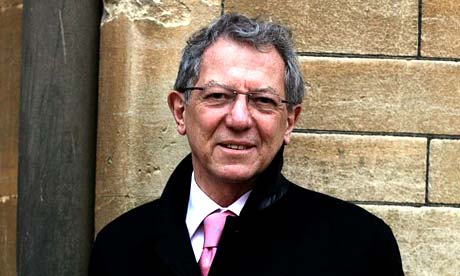12 January 2008Oliver Burkeman
 David King, former chief science advisor to the government. Photograph: Martin Godwin
David King, former chief science advisor to the government. Photograph: Martin GodwinThe list of people who have fallen out with Sir David King in recent years is long and diverse. It includes farmers, badger enthusiasts, climate-change denialists, environmentalists, anti-nuclear activists, the Daily Mail, the editor of the Lancet, and the Ferrari Owners' Club of Great Britain. Politicians have a shopworn response to this kind of 360-degree vilification - that if you're hated by people at different ends of the spectrum, you must be doing something right - but these days King doesn't feel any need to deploy it. Having emerged from seven years deep inside Whitehall as the government's chief scientific adviser, he is finally free to say that some people, in his opinion, are just wrong.
This he does quietly, with the air of a man unshakeably confident in himself, and in science. For example, you can't ruffle his demeanour by accusing him - as the Lancet editor, Dr Richard Horton, did last month - of "letting off blasts of hot and sometimes rancid air" in response to critics ("Richard is welcome to his views," King purrs). King's new book describes global warming as "probably the most serious [problem] that the human race has, collectively, ever faced" - but the mood that the South African-born King projects in person, in his new office at Oxford University, is most certainly not one of panic.
King, 68, is credited with first convincing Tony Blair of the overwhelming importance of climate change, but it's entirely in character that he now thinks some parts of the green movement are in danger of going too far. "The risk is that people feel the problem is being so overstated that it simply can't be true," he says. His book, The Hot Topic, co-written with the science journalist Gabrielle Walker, advises readers: "Don't be 'greener-than-thou': the evidence suggests that making people feel guilty makes them less likely to act, not more." The book is subtitled "How to tackle global warming and still keep the lights on." It is a sort of passionate call for judiciousness: an attempt to acknowledge the extent of the crisis, which King once argued was a bigger threat than terrorism, while keeping it within the realms of the imaginable - a problem to which we might all address ourselves, instead of seizing up in a paralysis of despair.
"There is a suspicion, and I have that suspicion myself, that a large number of people who label themselves 'green' are actually keen to take us back to the 18th or even the 17th century. [Their argument is] 'Let's get away from all the technological gizmos and developments of the 20th century'," he says. "And I think that is utter hopelessness ... What I'm looking for is technological solutions to a technologically driven problem, so the last thing we must do is eschew technology."
In the same spirit, the book argues that shopping for local produce in order to reduce "food miles" can backfire. UK-grown tomatoes, for example, can have a larger carbon footprint than Spanish ones transported to Britain, thanks to the heating and lighting the former require. King and Walker urge us to change our lightbulbs for energy-efficient ones, but they dissent from the Greenpeace/Friends of the Earth position by supporting flight offsetting schemes, and argue that flying has been scapegoated.
Global-warming denialists will find no solace here, but neither will hardline campaigners preaching austerity: that approach is dismissed as too alienating. Besides, King argues, "going green" in our personal lives, however radically, marginalises the issue. We should be thinking about our larger role in the economic revolution we must bring about.
"I think a lot of people are happy to say 'Oh, this is a big problem, I'll switch the lights off as I leave the room,' without following through in their everyday business life," he says. "So if you're running a fleet of cars for a company, say, you'll need to think hard about that." (A young female questioner recently asked him what people like her could do to help. "Stop admiring young men in Ferraris," he replied - which explains why the Ferrari Owners' Club took umbrage.)
Over new year, King was accused of being "demob happy" - of speaking out with a lack of his usual restraint on a range of issues, including genetically modified food (he is in favour of relaxing the current ban), on culling badgers to stop the spread of tuberculosis in cattle (he issued a controversial report in favour), and on the MMR vaccine panic (he blames the Daily Mail, and also the Lancet). In fact, he insists, he was simply asked about all these subjects at an end-of-tenure select committee session.
But he was back in the spotlight again this week, having been a major influence on Labour's decision to approve a new generation of nuclear power plants. Nuclear energy will be essential, he argues, if Britain is to meet its commitment to reduce carbon dioxide emissions by 60% on 1990 levels by 2050. (Campaigners counter that nuclear will deliver only a 4% cut sometime after 2025 - and that 60% is an insufficient overall target in any case.) "The problem of climate change will require us all to make some very hard choices," King and Walker write in The Hot Topic. Nuclear power "is not necessarily an ideal way to make energy, [but] the dangers of climate change are certainly far worse".
King infuriates people not just when they disagree with his interpretation of the science, but when his adherence to science seems impervious to public opinion. He learned that early in his tenure, during the first foot-and-mouth epidemic, when he successfully argued for "contiguous culling", the destruction of all animals on farms neighbouring the outbreaks. Subsequently, he recalls, he was "moved to tears" when he attended a play that dwelt on the social, emotional and economic effects of the cull. "But I believe that the action we took was necessary."
On another emotive matter of public science - the MMR vaccine panic - Horton, at the Lancet, faults King for acting as if "he would prefer the media not to exist at all". It is the fault of the government and the scientific establishment, Horton argues, if it cannot shore up public confidence in a safe vaccine. King is happy to concede that "initially I was very naive, going out there and thinking, 'All you've got to do is to explain the science.'" But he holds the media responsible for negative public opinion over MMR and GM - including the Lancet, which published papers on both topics. "Shouldn't you lay any blame on the editor of an outstanding journal for publishing the first [MMR] paper? Oh, and by the way - the editor of the same journal that published the Pusztai paper [questioning the safety of GM]? It's been acknowledged by the entire scientific community ... that those two papers were not worth publishing."
King, a career academic prior to his Whitehall appointment, is safely back in academia now, as head of a new school for "enterprise and the environment" at Oxford that seeks to infuse environmental thinking into the university's existing departments. And so to the elephant in the room: does he leave the government with the sense that any serious progress has been made on Britain's response to climate change? He might have convinced Blair - but to what actions did those convictions really lead? And what about the received Westminster wisdom that Gordon Brown cares less for the issue, fearing that addressing it would slow growth?
"There are two different answers to this question," King responds carefully. In the international arena, he credits Blair, at Gleneagles, with breaking the stalemate in which America refused to negotiate seriously unless China and India did too. "What really made a difference to Britain's position ... is that we could not be accused of hypocrisy. We were saying we're going to reduce our emissions by 60% by 2050, regardless of the state of international negotiations. When I visited the Indians, the discussions with us were very different than with the Americans. It's a case of 'My God, they're taking it seriously, so this must be a serious problem.'"
But he concedes that the domestic record has been much less impressive. Carbon dioxide emissions have risen slightly - partly, he says, because utilities firms have replaced power from decommissioned nuclear plants with power from coal and gas. Wind power has also been implemented too slowly, he says. "The government didn't focus early enough on the broad spectrum of activity that would be required." On the question of Brown's personal commitment, he remains studiedly neutral. "Any prime minister is going to be somewhat cautious on this, precisely because they feel that if the economy is dented by following this route, they will be out at the next election." King himself says he believes saving the planet needn't mean economic slowdown.
It's a characteristic King viewpoint, blending realism with a faith in future technological progress that many might regard as too optimistic. In The Hot Topic, King and Walker reproduce a map of the world on which are superimposed six relatively tiny squares. If all the sunlight falling on those six squares could be harvested, they explain, all the world's energy needs could be met. The map takes up the last page in their book. It is a seductive image: global warming as a story that ends happily.
King's way: how to fight climate change
Count food miles
A good rule of thumb is that if something is in season and grown locally, it's likely to have made fewer emissions than something from far away. But tomatoes grown in the UK can have a larger carbon footprint than those grown in sunny Spain.
Calculate your carbon footprint
Calculators on the internet enable you to work out the volume of emissions you are responsible for.
Switch off at the wall
Don't leave appliances on standby.
Buy energy-efficient appliances
Digital radios draw much more energy than analogue ones, and plasma TVs are monster power-users. Choose an LCD screen.
Stay warm, stay cool
Seal off draughts and turn down the thermostat.
Change your lightbulbs
Low-energy lightbulbs cost more, but pay off over time.
http://www.guardian.co.uk/environment/2008/jan/12/climatechange.carbonemissions






